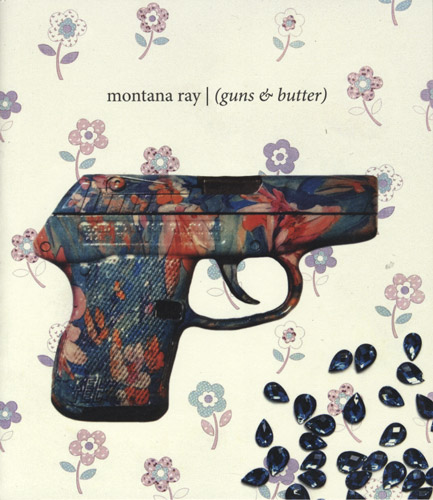(guns & butter)
If you Google search Montana Ray, there is a good chance you will find a (guns and butter) shower curtain. This lends to the understanding of concrete poems and their relationship to the modern dialogue in poetry. Concrete poems, or shape poems/visual poems can be considered the bastard child of literature. An exercise in class that only the nerdy kids take seriously. A fun exercise that is just that: an exercise. However, in subverting this notion, Montana Ray finds the means to exalt the depraved and to tyrannize the tyrannical. If you Google search Montana Ray, there is a good chance you will find a (guns and butter) shower curtain. This lends to the understanding of concrete poems and their relationship to the modern dialogue in poetry. Concrete poems, or shape poems/visual poems can be considered the bastard child of literature. An exercise in class that only the nerdy kids take seriously. A fun exercise that is just that: an exercise. However, in subverting this notion, Montana Ray finds the means to exalt the depraved and to tyrannize the tyrannical.
Every poem is shaped like a gun . . . except the recipes. The recipes are shaped like recipes however, keeping totally congruent with the theme she has developed. But what is the theme? The direction is at once personal and dynamic and universal. “Ruthie’s Mom’s Shrimp & Grits” is a personal title that we as readers could assume are some damn good grits that should be shared with the world. While that poem sits across from a gun, it begins to speak to the way violence is weaved into our nature. As much a part of our culture as sharing recipes, is shooting violence.
But the violence that we intellectuals perpetrate on each other is a different sort. It isn’t the physical ‘capping of that ass’ so much as the skewering of personality, the exaltation of character flaws. “(remember that year) (the spirits” speaks to this quite directly: “(when u text me) ( happy anniversary / of you cheating on me) (what to say of my infidelity) (except which one?)”
This is nearly merciless. The gun that we carry is language. “(this luggage / of language),” to be exact, is the very thing that we wish to set down. We set it down un-carefully on others often. And sometimes we set it down with absolute perfection on others and watch the damage ensue. Ray reverses the trajectory of the tale in saying that she couldn’t even identify the cheating.
The concrete poem poses a restraint, a parameter in which to guide the writing and force Ray to stay within. Just as striking is the use of the parentheses. Every poem is exactly the same: a gun. But within each piece are these totally separated and kept apart pieces. They function as the makeup, the composition of the poem. This almost speaks to the randomness of mass violence. While there are obvious patterns, there are really never enough predictors. This can be seen in the separation and lack of cohesion, but this isn’t to say that the lines themselves aren’t linked.
(if the camera
is god) (it understands) (the complexities of a woman)
(w/her blouse undone) (holding
a machinegun) (on an album cover)
The poems are totally coherent and lend each line to one another. But each line can stand alone in saying something about Montana Ray’s world. “(she be like)” places Montana Ray’s world a little more. The reader sees a little further into the political spectrum and broad nature of her surroundings: “(her heartaches were gov’t conspiracies) (her arguments crept to ur bed / in the night) (her neck was a crocodile river) (& her lingerie was Czech / architecture) (they found her heart in a file cabinet).” This sounds like the sort who may be concerned with gun violence, but not the passive and mindless who occupy their time with internet arguments and then merely return to their waking lives in a lousy state of nonaction. However, just as in all pieces, Ray points out the flaws that are actively working. In discussing the subject of this poem’s body parts, she states that “(her footprints, animal).” So, no matter how clever and beautiful the woman may be, she is still as lecherous as anything else firing in this book.
The book finishes with a series of poems abounding in Ray’s content. They are metaphors for the greater woman, for the big sky country that is the world at large. “(United States) (of Montana)” makes use of the mountains that are in Montana in saying that “( . . . the afternoon is strange, haunting, / awful) (hear the buzzing in the hot / grass) (coming from the live things).” This is a truth akin to all truths. That all live things buzz with strangeness. It is the haunt that lingers after the gunshots have fired and the domestication has ceased. That said, it was really easy to make the “Eggs in Purgatory” sans chorizo, but the “Mango” soup looked best.





